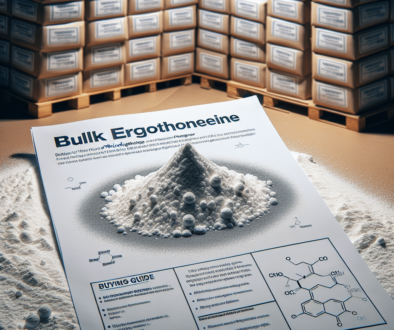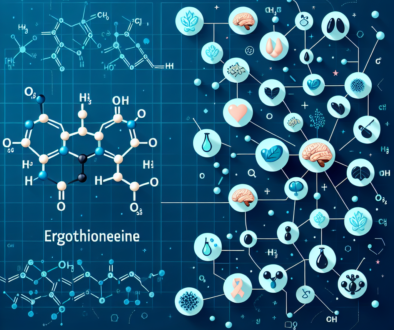Fighting Neurotoxicity: Ergothioneine’s Role in Cellular Protection
-
Table of Contents
- Ergothioneine’s Role in Neuroprotection: A Cellular Shield Against Toxins
- Understanding Neurotoxicity and Its Impacts
- The Protective Power of Ergothioneine
- Antioxidant Mechanisms
- Anti-Inflammatory Effects
- Regulation of Cell Survival and Death
- Research Highlights on Ergothioneine and Neuroprotection
- Case Studies and Clinical Trials
- Statistical Evidence
- Food Sources and Supplementation of Ergothioneine
- Rich Dietary Sources
- Supplementation Benefits
- Conclusion: Ergothioneine as a Neuroprotective Ally
- ETprotein: Your Source for High-Quality Ergothioneine
Ergothioneine’s Role in Neuroprotection: A Cellular Shield Against Toxins

Neurotoxicity is a significant concern in the modern world, where exposure to various environmental toxins, dietary factors, and lifestyle choices can adversely affect brain health. As research delves deeper into the mechanisms of cellular protection, a particular compound has garnered attention for its potential neuroprotective properties: ergothioneine. This article explores the role of ergothioneine in fighting neurotoxicity and how it contributes to cellular protection.
Understanding Neurotoxicity and Its Impacts
Neurotoxicity refers to damage caused to the nervous system by harmful substances, which can lead to a range of neurological disorders and diseases. These toxic agents can include heavy metals, pesticides, industrial chemicals, and even certain medications. The consequences of neurotoxicity are profound, potentially resulting in cognitive decline, motor dysfunction, and neurodegenerative diseases like Alzheimer’s and Parkinson’s.
The Protective Power of Ergothioneine
Ergothioneine is a naturally occurring amino acid derivative found in various foods, such as mushrooms, black beans, and certain meats. It has unique antioxidant properties that make it a potent protector against oxidative stress, a key factor in neurotoxicity. Unlike other antioxidants, ergothioneine has a specific transporter in the human body, indicating its importance in physiological processes.
Antioxidant Mechanisms
Ergothioneine’s antioxidant capabilities are central to its neuroprotective role. It scavenges free radicals, reduces oxidative damage to cellular components, and helps maintain the integrity of cellular structures, including DNA, proteins, and lipid membranes.
Anti-Inflammatory Effects
Inflammation is another contributor to neurotoxicity. Ergothioneine exhibits anti-inflammatory properties by modulating inflammatory pathways and cytokine production, which can help prevent or reduce the progression of neuroinflammatory conditions.
Regulation of Cell Survival and Death
Cellular homeostasis is a delicate balance between cell survival and programmed cell death (apoptosis). Ergothioneine has been shown to support cell survival by protecting mitochondrial function and inhibiting apoptosis-inducing factors.
Research Highlights on Ergothioneine and Neuroprotection
Several studies have highlighted the potential of ergothioneine in neuroprotection. For instance, research has demonstrated its ability to mitigate the effects of neurotoxins like methylmercury and beta-amyloid peptides, which are associated with neurodegenerative diseases.
Case Studies and Clinical Trials
Case studies and clinical trials have provided valuable insights into ergothioneine’s therapeutic potential. For example, a study on Parkinson’s disease models showed that ergothioneine could protect dopaminergic neurons from degeneration.
Statistical Evidence
Statistical analyses have reinforced the significance of ergothioneine in neuroprotection. Data suggests that higher dietary intake of ergothioneine correlates with reduced risk of neurodegenerative diseases, supporting its role in maintaining brain health.
Food Sources and Supplementation of Ergothioneine
While ergothioneine is present in certain foods, the modern diet may not provide sufficient amounts for optimal neuroprotection. Supplementation can be a practical approach to ensure adequate intake of this critical compound.
Rich Dietary Sources
- Mushrooms (especially porcini, oyster, and shiitake)
- Black beans and kidney beans
- Meat (particularly from animals that have grazed on ergothioneine-rich pastures)
Supplementation Benefits
Supplementing with ergothioneine can help bridge the gap between dietary intake and the body’s needs, especially for individuals at risk of neurotoxicity or those with limited access to ergothioneine-rich foods.
Conclusion: Ergothioneine as a Neuroprotective Ally
In conclusion, ergothioneine emerges as a promising ally in the fight against neurotoxicity. Its antioxidant, anti-inflammatory, and cell-regulatory properties contribute to its potential in safeguarding the nervous system. While further research is needed to fully understand its mechanisms and applications, current evidence supports the inclusion of ergothioneine in strategies aimed at promoting brain health and preventing neurodegenerative diseases.
ETprotein: Your Source for High-Quality Ergothioneine
If you’re looking to incorporate ergothioneine into your diet or product offerings, ETprotein is your go-to source. They offer a range of protein products that are not only rich in ergothioneine but also adhere to the highest quality standards.
ETprotein’s L-(+)-Ergothioneine (EGT) comes in various grades suitable for pharmaceutical, food, cosmetic, and reference applications. With purity levels exceeding 98%, their ergothioneine products are designed to meet the needs of various industries, including nutraceuticals, pharmaceuticals, and cosmeceuticals.
For those interested in exploring the benefits of ergothioneine and other high-quality protein products, ETprotein provides comprehensive solutions. Contact them today to learn more about their offerings and how they can support your health or business needs.
About ETprotein:
ETprotein, a reputable protein and L-(+)-Ergothioneine (EGT) Chinese factory manufacturer and supplier, is renowned for producing, stocking, exporting, and delivering the highest quality organic bulk vegan proteins and L-(+)-Ergothioneine. They include Organic rice protein, clear rice protein, pea protein, clear pea protein, watermelon seed protein, pumpkin seed protein, sunflower seed protein, mung bean protein, peanut protein, and L-(+)-Ergothioneine EGT Pharmaceutical grade, L-(+)-Ergothioneine EGT food grade, L-(+)-Ergothioneine EGT cosmetic grade, L-(+)-Ergothioneine EGT reference grade and L-(+)-Ergothioneine EGT standard. Their offerings, characterized by a neutral taste, non-GMO, allergen-free attributes, with L-(+)-Ergothioneine purity over 98%, 99%, cater to a diverse range of industries. They serve nutraceutical, pharmaceutical, cosmeceutical, veterinary, as well as food and beverage finished product distributors, traders, and manufacturers across Europe, USA, Canada, Australia, Thailand, Japan, Korea, Brazil, and Chile, among others.
ETprotein specialization includes exporting and delivering tailor-made protein powder and finished nutritional supplements. Their extensive product range covers sectors like Food and Beverage, Sports Nutrition, Weight Management, Dietary Supplements, Health and Wellness Products, and Infant Formula, ensuring comprehensive solutions to meet all your protein needs.
As a trusted company by leading global food and beverage brands and Fortune 500 companies, ETprotein reinforces China’s reputation in the global arena. For more information or to sample their products, please contact them and email sales(at)ETprotein.com today.














